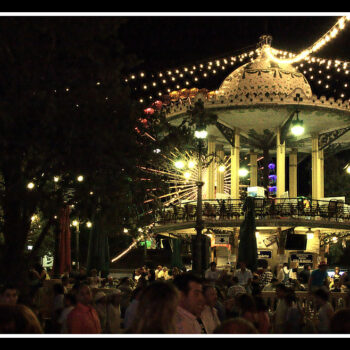

One of the most fun and effective ways of learning a new language is to get to know the literature written in that language. In particular, the Spanish language has many exciting books.
Spanish Express will guide you whilst reading and studying the greatest exponents of Spanish literature. There is also a wide range of film titles on offer. 📚🎬
Come and discover these great titles with our Spanish Film & Literature Workshops. Working in a team will make it easier for you to get to know the different titles in an enjoyable way 😉.
In this article’s case, we will tell you about Ficciones. It is one of the most important and influential books of short stories in all of the Spanish language literature and an unbeatable way to get to know our workshops. 😁
Discover this impressive compendium of short stories by Jorge Luis Borges and take your Spanish language skills to a new level. 🙌
Let’s get started!
Ficciones
Ficciones, published in 1944, is one of the essential books of short stories by the prestigious Argentine author Jorge Luis Borges. Through its 18 stories, the reader can enter a rich universe full of labyrinths, libraries, mirrors, and symbols.
The first part of the book, “The Garden of Forking Paths”, was published individually in 1941. This section consists of nine stories. Subsequently, the author added another nine stories in a second part called “Artificios”. From the union of the two, the book Ficciones, as we know it in its present form, was written.
The book starts off with the story “Tlön, Uqbar, Orbis Tertius”, where we see a fictional Borges discussing with Bioy Casares, his great friend, a mysterious territory: Tlön. After the narrator’s enquiries, the reader discovers that Tlön is nothing more than an invention of a group of intellectuals that will come to supplant the real world after several generations.
In “Las ruinas circulares”, we witness a dreamlike reality, another of the themes of Ficciones. A magician wishes to dream of a man until he materialises him in flesh and blood. To achieve this, he goes to the Temple of Fire and asks the god there for help to achieve his goal.
The god helps him on the condition that he teaches his dream son to worship Fire. The magician makes his dream come true, but years later, he discovers that he is the product of another man’s dream.
“The Library of Babel” is one of the most famous stories in Ficciones. The narrator masterfully exposes the metaphorical possibility that the entire history of the world and every human being is contained in a library. It is also possible that there is a library section dedicated to each possible future.
In the section “Artificios”, we find the story “Funes el memorioso”. Funes is an Uruguayan who has acquired an exceptional memory due to a fall and a blow to the head. As a result, he can remember everything and everyone, with complete detail of every moment of his life, that of others and every object.
However, what could be a gift ends up being a curse. Given an infinite remembrance, Funes cannot abstract himself from his memories to think and reason like any other person.
Moving into the fantastic realm, we find “El milagro secreto”. Its plot, apparently simple in appearance, is nourished by multiple conjectures and philosophical reflections. The main character is a man about to be executed.
Before being shot, he asked the god to allow him to finish writing a play he was working on. God indulges him, stops time, and the man finishes his play. Then, back in the present, the man drops dead.
Perhaps one of the most cryptic stories in the book is “The sect of the Phoenix”. Using metaphorical and symbolic language, the narrator plays with the reader’s mind through the concealment of a secret that is, at the bottom, a banal reality.
Ficciones concludes with “El Sur”. Here we see Juan Dahlmann suffering from an infection caused by a blow to the head from a window frame. He is admitted to a hospital, and when he leaves, he decides to go to the South to recover in an environment far from the city.
Once on the pampas, he encounters a bandit gang. One of these outlaws challenges Dahlmann to a knife duel to death. Dahlmann accepts with the certainty that he will die. In the end, however, we discover that Dahlmann has never left the hospital and is dying of infection.
These are just some of the 18 beautiful stories that make up Ficciones. In our workshop, you can study each of them in depth.
Jorge Luis Borges
Jorge Luis Borges was an Argentine writer born in Buenos Aires, Argentina, on 24 August 1899. He is considered one of the most important and influential authors of South America.
From an early age, Borges showed a precocious talent for literature and the study of languages. At the age of four, he was already reading and writing correctly, and his father’s extensive library, which consisted of books in Spanish and English, stimulated his taste for reading. In addition, thanks to the care of a British governess, he mastered the language of Shakespeare very early on.
At the age of six, he wrote his first short story, “La visera fatal”, in which the influence of Cervantes was evident, and at the age of eleven, he wrote his first translation. It was a story by Oscar Wilde called “The Happy Prince”.
When he was 15, he moved with his family to Europe because his father had hereditary blindness and was more likely to seek treatment options on the old continent. When World War I broke out, they settled in Geneva, Switzerland; a city Borges would become especially fond of.
From the 1920s onwards, Borges began publishing essays, short stories, and poems after his return to Argentina. First in magazines and newspapers and later in books signed with his name.
His erudite, hermetic, and concise style attracted the attention of local readers. In addition, his friendship with other exponents of Argentine literature, such as Adolfo Bioy Casares and Ernesto Sabato, was well known.
The maturity and consolidation of his figure came between the 1940s and 1950s, mainly due to two books of short stories: Ficciones and El Aleph. These compendiums are considered the pinnacle of his work and one of the pinnacles of Spanish-language literature.
At the age of 55, Borges became almost blind as a result of the same illness his father had suffered from. Many critics and specialised readers have noted that this caused a change of style in his work.
Although he was not part of the so-called Latin American Boom, he would unintentionally benefit from this movement. Thanks to the attention given to literature written in Latin America during the 1960s and 1970s, many readers around the world were introduced to some of the antecedents of the Boom, including, of course, Jorge Luis Borges.
From then on, Borges’ work would achieve universal fame. He won significant awards, such as the Formentor Prize and the Cervantes Prize. In addition, he was nominated for the Nobel Prize several times. Still, it is presumed that his political stances, sympathetic to the military dictatorships of the time, prevented him from receiving this award.
He died at 86 on 14 June 1986 in the city that he loved, Geneva. His work enjoys high popularity and is continually studied and read by readers worldwide.
What did you learn from this overview? Let’s test your knowledge!
Would you like to prepare for the Pearson Edexcel Spanish A-Level exam with us?
Spanish Express offers different Spanish A-Level programmes for adolescents and adults as part of our language tuition services.
We provide an online learning experience for students across the globe with our Spanish A-Level Private Tuition.
You can prepare for the Pearson Edexcel Spanish A level with us and take the exam for the Pearson Edexcel Level 3 Advanced GCE in Spanish in our London exam centre!
On the other side, our Spanish Express’ Spanish film & literature Ultimate Workshops can be offered to individual students and Sixth Form Colleges, where a single or a series of bespoke workshops can be organised for an A-Level group.
With these workshops, you will be very well prepared and ready to take the Pearson Edexcel Paper 2: Written response to works and translation in Spanish.
Please contact us for a free consultation whether you need help with Spanish individual private tuition, the Spanish academic year programme, or simply general information about Spanish Film & Literature workshops or the Spanish Homestay Immersion Programmes in Spain.
Get to know more exponents of Hispanic literature with Spanish Express! 💃
Did you enjoy this story about Ficciones? 👀
Apart from this title, more than 20 other works will be available in our Spanish Film & Literature Workshops. 🙌
If you decide to join our workshops, you will discover hundreds of books and films, both from Spain and Latin America, that will allow you to improve your Spanish. 😎
At the same time, you will delve into the varied and wide-ranging culture of the Spanish language. 😊
Don’t let another day go by without joining our workshops – let’s make the next play an adventure! 🤝
Ginnette Di Damaso
Spanish Express Blogger



